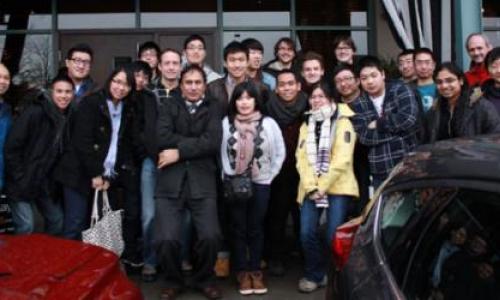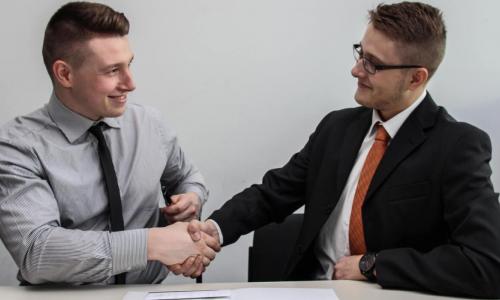
My tenure as a student at SFU has been a long one. Much longer than I had planned when I enrolled as a fresh, bright-eyed, high-school graduate who believed he could take on the world. As cliché as that may sound, I’ve always been a bit of a dreamer, and a good portion of my ambitious dreams has always been to build my own tech empire. Enthralled by technology at a young age thanks to my father’s proclivity towards science fiction, I became absolutely enamored by the infinite possibilities of the evolving tech field. So, of course, when it came time to choosing which university programs to apply to, engineering was at the top of my list. Three times over, actually: aerospace engineering, electrical engineering, and materials engineering. Come time to actually apply, I decided I didn’t want to move to eastern Canada to attend one of the only three schools that had an aerospace program, so I settled on what I could find in B.C.
Engineering programs typically start you with a few semesters or so of general topics that are applicable to most sub-fields, so I started off at Simon Fraser University’s Burnaby campus in the general engineering program. While trying to decide between Systems Engineering and Electrical Engineering, I learned of the Mechatronic Systems Engineering program which combines electrical, control systems, and mechanical engineering to create a robotics-esque specialty. Naturally, I jumped at this idea when I heard about it because my immediate thought was: “I CAN BUILD AN IRON MAN SUIT!” But…there was one small hiccup. Since the Mechatronics program was so specialized, it combined three fields of study into one four-year program, had its own faculty, and meant I had to synchronize my schedule with the MSE curriculum.
I’ve never been a big fan of school, so having my graduation set back a year because I had to take a bunch of extra classes was not something I was happy about. If I’m being totally honest, the school makes me quite miserable, and even more irritable/unhappy with my personal life. After slowly trudging my way through courses in MSE, I decided to take another year off to go travel and work in Northern B.C. as a logger for my uncle’s company to save some tuition money. As much as I detest school, I’m not a quitter, and I’m quite stubborn, so naturally, it was my plan to return to school and slug it out with my last few semesters. I even developed a more…robust…work ethic while working 12- to 16-hour days in the bush, so I decided to take more classes than ever to finish in a set time-frame.

It was brutal and miserable, but I started to enjoy it more in my last year. I decided to enroll in the Tech-E program at SFU for my capstone project—a special program that pairs MSE students with Business students to select a problem/idea they want to work on and create the beginnings of a company around their capstone project. Knowing I wanted to start my own company someday, this seemed like the perfect way to round out my degree. Not to mention it gave us special funding to prototype and develop our capstone project.
Around the time we were forming teams and ideas for our Tech-E capstone groups, I was due for my third mandatory co-op. I managed to land a co-op at a Vancouver software start-up, putting me full-swing into start-up mode for my final year in MSE. This is around the time my opinion of SFU and post-secondary education started to turn for the better.
I was finally getting to do some of the stuff I had been wanting to work on for years and the deeper I got into the Tech-E program, the more opportunity I had to see what some particularly amazing SFU faculty members were trying to accomplish at the school. The Tech-E program had given birth to an unprecedented prospect for entrepreneurship-loving students that were dedicated to taking their Tech-E projects further. The school would actually fund the teams to continue building their prototypes and companies in the form of a co-op.
Despite being someone with no safety-net post-graduation, I would much rather risk going broke as a start-up founder than working in some boring, bureaucratic company. As such, I couldn’t fathom a better scenario than joining Tech-E and having the school fund my first venture. As stubborn as I am, I refused to even acknowledge the possibility that my team wouldn’t get funded. And I was right, we got the offer. We got to form a company and build our first prototype with funding from SFU.
We buckled down, we worked on our company and our technology, we pivoted a few times, and before we knew it, the semester was nearly over. We hadn’t raised any new funds, we had no revenue, and we had no idea what would happen the next semester. In early December, three members of the team flew to Toronto to participate in Next Canada’s the Next 36 selection weekend—an early-stage start-up accelerator aimed at giving young Canadians the tools they needed to be the future big-business founders of the country. Two of my fellow co-founders were invited to participate in the program, which would start in May 2018, so the company was in, and it didn’t matter that I wasn’t personally invited.
We now had an idea of where we would be in four months; however, Next 36 offered little funding for the company and forced founders to pay their own living expenses, while participating in an intensive, four-month program. Now, Next 36 is definitely one of Canada’s best attempts at a start-up accelerator…but it is, unfortunately, just that…an attempt. Expecting people to work exclusively on their company while taking MBA-level courses multiple hours of every day of the week, and forcing them to pay their own living expenses is insane. Combine that with the minuscule funding of ‘up to $80,000,’ and it’s no wonder why the Canadian start-up eco-system is paling in comparison to the US.
At nearly the same time we applied to Next 36, our company also applied to an international, Chinese-Silicon Valley accelerator that specialized in hardware companies. This accelerator is called HAX, and offered substantially more funding and value than Next 36, while only asking for barely more equity in our company. After our first interview with HAX, we hadn’t heard back from them by the end of December when they told us to expect a response. By then, we were positive that we hadn’t made the cut, but at the same time, there was talk that we might be able to extend our SFU funded co-op.
Our team holds the highest regard for everyone at SFU involved in the entrepreneurship and innovation initiative, but there is not a word, phrase, or paragraph that could accurately express the gratitude I carry for these amazing people. They gave our team a second funded co-op. As if one semester of a university paying students to start a company wasn’t unprecedented enough, they gave us two. They believed in us as a team, and in the problem, we were tackling.
I often stubbornly push for the things I want in life, and I certainly didn’t just sit and wait patiently for them to offer us more money—I did everything I could to show them we were worth the investment—but it was a massive relief to know I could afford rent in January. Now we had our timeline planned until the end of August when Next 36 finished, even if I had no idea how I would pay my living expenses in Toronto. Our first week back in the Coast Capital Savings Venture Connection Incubator office at SFU Surrey campus, we emailed HAX to get feedback on our application and interview.
Being born with the ‘take-on-the-world’ mindset, I’ve always been a big fan of the long-shot odds. Hell, I based my future career and livelihood on entrepreneurship—something with barely-better odds than winning the lottery. So, I had liked our odds with HAX from the beginning, but I admit by this first week back, I thought we were out. Sure enough, the response to our request for feedback was asking us for a second interview with the managing partner of the program. After this interview I was positive we were in; confidence not quite shared by the rest of my team. The following week we had an interview with the program director and lead engineer of HAX as the final round of interviews. Then there was silence. Again.
After two nerve-wracking weeks of radio-silence, we got the offer for HAX. We would get to go to Shenzhen, China, followed by San Francisco for the world’s first, leading, and largest hardware start-up accelerator. Not to mention they offered notably more than twice the money that Next 36 would only potentially provide. Suddenly we were funded. We had a clear game-plan for our technology and business development, and we had all of the resources we would need to pull it off in the world's capital for hardware development. The only catch was that we had one month to relocate to China.
The day after we received the offer, it so happened that every single one of our mentors was unavailable to speak with us. It made for a long and anxious day. Getting past that, we had only a week to have our lawyers review all the legal paperwork and make the very obvious decision to abandon Next 36 and move to China for HAX. The stress wasn’t quite done with us, though. Of the remaining three weeks we had to relocate, one whole week was stricken from our ability to plan because of the Chinese New Year. This meant that our visas were in limbo, and our team was divided on whether we should buy our plane tickets or not. Once again, I played the odds and bought my ticket as soon as we finalized our legal paperwork with HAX, making them an official investor in our company.
Sure enough, I got my visa a day before my flight, and the next chapter for our company began: hyper-acceleration in the hardware capital of the world.
When I initially wrote this, we were about 35 days into the program. We had just finished our +30-day review demo a couple of days prior, and our progress is at least four-fold what it was in Vancouver. The HAX investment paid for our living expenses—unlike the forgone Next 36 funding—and we were free to really focus all of our energies on building our baby. We have 42,000 square feet of office space to utilize, which mirrors another 42,000 square feet of workshop and lab space which comes fully stocked will just about any tool, machine, gadget, or simple-consumable part we could need. The office is literally on top of the electronics market super-cluster of Huaqiangbei Road. And we had HAX’s full-time team of engineers, designers, marketing specialists, and prototypers at our full disposal at no cost to us. Plus, every founder from every HAX company we’ve met so far has been awesome and super down-to-earth.
With our batch, HAX has changed its formula from taking 15 teams in a cohort twice a year, to taking 3-to-5 teams per month. Our batch had 3 of 5 teams from Canada, so we were certainly not the only Canucks around. Some of the alumni teams—which get to utilize the office and workshop space for free if they desire, even after finishing the program—are also Canadians that have been here for 2+ years already.
After only 35 days, we were fairly certain that even if we made it to San Francisco at the 4-month mark, like we’re supposed to (and ended up half-succeeding in—half our team is still in Shenzhen while I’ve been in San Francisco for four months now, and two team members are back in Vancouver), we’d likely be back in Shenzhen for manufacturing. We know it’s going to be a long road still ahead of us as we pursue clinical trials for our device which has evolved into a class II medical device, and if the Orenda Coffee team from UBC is any indicator, it could be quite some time before we all make it back home. But now we have an army of people supporting us; between the local Vancouver scene, and the HAX network. An army that grows every day as the number of our supporters grows. Our vision of ending sleepless nights feels a lot less like a school project, and a lot more like an achievable goal.
Beyond the Blog
-
Find out more about Zennea Tech here.













